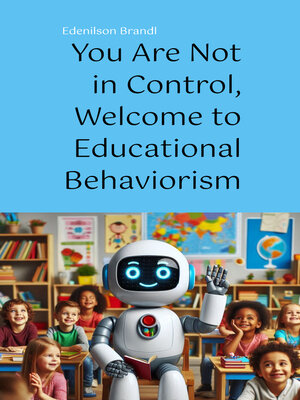
Sign up to save your library
With an OverDrive account, you can save your favorite libraries for at-a-glance information about availability. Find out more about OverDrive accounts.
Find this title in Libby, the library reading app by OverDrive.



Search for a digital library with this title
Title found at these libraries:
| Library Name | Distance |
|---|---|
| Loading... |
Behaviorism has long been a cornerstone of educational psychology, shaping how we understand and influence student learning and behavior. Its principles, rooted in observable and measurable changes, have transformed classrooms, instructional strategies, and educational policies. Yet, in today's rapidly evolving educational landscape, behaviorism is often misunderstood, undervalued, or misapplied. This book, You Are Not in Control: Welcome to Educational Behaviorism, is both a guide and a challenge to educators, researchers, and policymakers to rediscover the relevance of behaviorism and apply its concepts with clarity, precision, and humanity.
This work was born from a fundamental question: What does it mean to shape behavior in the classroom? In addressing this question, the book seeks to uncover the complex interplay between theory and practice. It delves into foundational ideas, such as classical and operant conditioning, while critically examining their applications, limitations, and ethical implications in modern education. Each chapter is designed to provide readers with practical insights, whether they are seasoned educators seeking to refine their approaches or students of education looking to grasp the essence of behaviorism in action.
The title of this book—You Are Not in Control—highlights a core paradox of behaviorism. While educators may implement structured techniques to influence behavior, true control is an illusion. Behavior is shaped by myriad external and internal variables, from environmental stimuli to intrinsic motivation. Recognizing this reality compels us to focus not on rigid control but on creating adaptive, enriching environments where learning and positive behavior can thrive.
Throughout this journey, you will encounter a range of topics, from reinforcement strategies to technology integration, from ethical dilemmas to cultural considerations. Special attention is given to bridging theory with practice, ensuring that every concept is backed by practical examples and actionable strategies. Moreover, this book encourages reflection: Are we using behaviorism to empower students or simply to enforce compliance? How can behaviorist principles coexist with other educational paradigms, like constructivism and humanism?
This preface serves as an invitation to explore these questions and more. Whether you are an advocate of behaviorism, a skeptic, or someone seeking to broaden your pedagogical toolkit, this book welcomes you into a critical and evolving conversation about how we teach, learn, and grow together in educational spaces.
Let us embark on this exploration of behaviorism—not as a static framework but as a dynamic, adaptable approach to shaping the minds and futures of learners worldwide.







